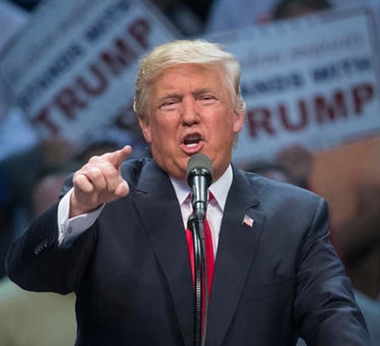Trump’s campaign not just poor; it spends a lot with his own companies

By Rob Howard
Associate Editor
Donald Trump’s latest Federal Election Commission disclosure first shocked campaign observers with the news that the Trump campaign had just $1.3 million on hand at the end of May. Hillary Clinton had $42.5 million on hand at the same time.
But, probably to the Donald’s consternation, diving deeper into the report caused a lot of raised eyebrows and dropped jaws. The New Republic headlined, “Donald Trump’s campaign may just be an elaborate shell game.”
Rachel Maddow’s Tuesday night program on MSNBC focused on past presidential campaigns, where the candidates weren’t successful, but spent a lot of time hawking books that made candidates a lot of money. Trump has written a lot of books, and according to the clips Maddow showed, he isn’t reluctant about promoting them during campaign stops.
New Republic, in its story, dragged up a Fortune magazine quote from a Trump interview in 2000, in which he said, “It’s very possible that I could be the first presidential candidate to run and make money on it.”
The magazine pointed out the detail buried in the report: “As the May FEC report makes clear, the main beneficiaries of Trump’s campaign are his own businesses.”
And pundits were gleeful in bringing up President Obama’s remarks about Trump at the 2016 White House Correspondents’ Dinner, where he said, “The guy wanted to give his hotel business a boost.”
In fact, of the $6.7 million the Trump campaign spent in May, nearly 20 percent went to Trump-owned businesses or family members, according to Market Watch.
Major expenditures to Trump-owned businesses in May include:
$712,185 to Trump Tower, for rental; $493,000 to rent Trump facilities such as Mar-A-Lago in Florida, which is his vacation home; $350,000 for the use of his private jet; almost $138 thousand to Trump Restaurants; $128,000 to Trump Corporation; almost $5 thousand to Eric Trump Wine Manufacturing (Eric is his son); and varying other amounts down to $94.61 for the Trump Café.
Eric Trump also heads a philanthropy – the Eric Trump Foundation – which helps children with terminal illness. One of his board members is Christl Mahfouz, who is president and owner of Ace Specialties, which distributes Trump’s signature “Make America Great Again” hats. The payment to Ace Specialties since the campaign began has been $4.7 million.
Channeling money to businesses you own is not illegal. The Associated Press said the normal process for wealthy candidates is to “wall off” campaigns from their companies, “Wealthy political candidates in the past, including New York Mayor Michael Bloomberg and presidential contender Steve Forbes both walled off their campaigns from the companies bearing their names.
“Not so for Trump. Through the end of May, his campaign had plowed about $6 million back into Trump corporate products and services, a review of federal filings shows. That's nearly 10 percent of his expenditures.
“There's nothing illegal about it. Regulations do require companies— even ones owned by the candidate— to charge fair-market value so as not to run afoul of a ban on corporate campaign contributions.
“They also require some complicated record-keeping.
“For instance, FEC reports show the campaign making about $400,000 in payments to Trump. But that's a campaign finance accounting quirk. What's actually happened is that Trump donated $400,000 in campaign office space and some salaries of company employees who have been working on his presidential bid.
“Yet Trump's companies also charge his campaign for goods and services, putting him at risk of appearing to be a self-dealer. That's why Forbes and Bloomberg avoided the issue altogether, former aides said.”
And one more complication, according to the FEC report, according to AP: “The $46 million worth of loans Trump made to his campaign can be repaid with donor money, even though he insists he won't do that.
“The situation has some donors spooked, said Charlie Spies, a Republican elections attorney who has worked with major contributors and was helping Trump opponent Jeb Bush.
"’Why would donors give money when the first dollars go to help a billionaire buy products from his own company?’ Spies asked.”
“Donald Trump hates disclosure,” according to The Atlantic, which continued, “looking at his most recent Federal Election Commission disclosure, it’s not hard to see why. The report is brutal for the presumptive Republican nominee.”
It will be interesting to see how Trump deals with an under-funded campaign, with allegations that he is merely enriching himself at the expense of donors, and with the reluctance of donors to give money, much of which goes toward his own companies, and some of which could go to paying off Trump’s loans to the campaign.
The Gayly – June 22, 2016 @ 1:30 p.m.





